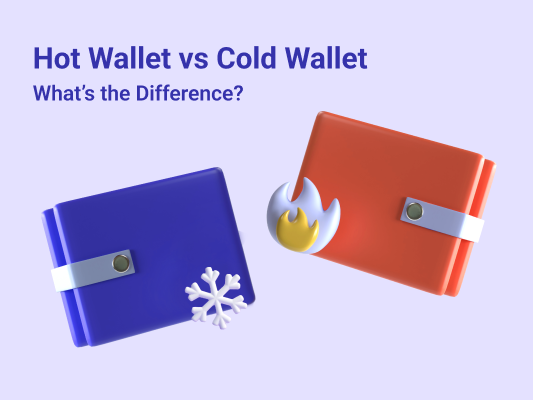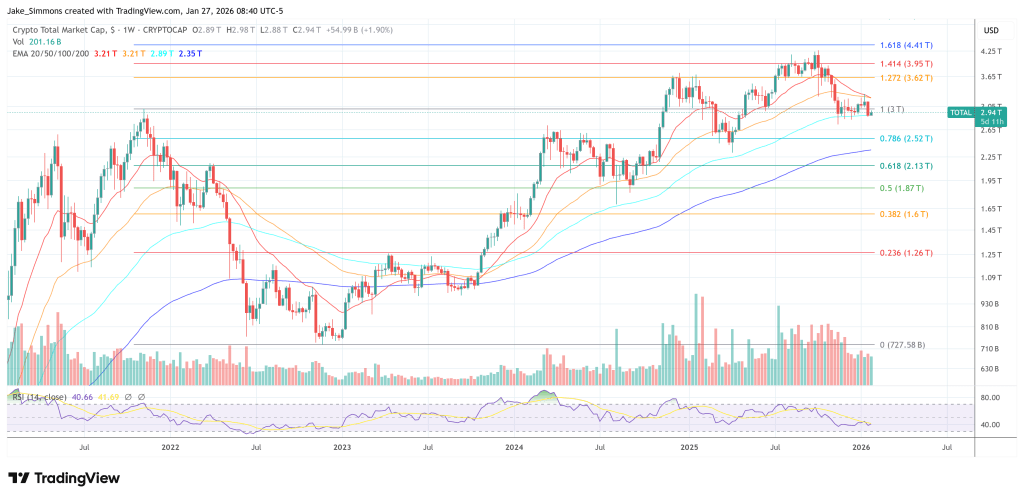
Decentralized finance (DeFi) has brought a sweeping change in the financial world by allowing millions of people who don't have access to traditional economic systems to be in full control of their finances. Cryptocurrencies are gaining traction as part of a well-balanced crypto portfolio, and all you need to access DeFi services ranging from efficient stablecoin trading, decentralized lending or Yield Farming, DEX (Decentralized exchanges), DeFi insurance, liquidity mining, prediction market, NFTs, etc., is an internet connection, and a cryptocurrency wallet that securely stores all your digital assets.
While blockchain networks are notoriously difficult to hack, cybercriminals often find ways to exploit users to gain access to their funds. So, cryptocurrency investors need a secure and reliable crypto wallet to store their digital assets. The safety and security of your digital assets are paramount because if your crypto assets are lost due to some error or stolen by some hacker, it's nearly impossible to track down and recover those funds.
With the fast pace of innovation in the crypto world and the decentralized finance ecosystem, the number of digital wallets continues to increase, making it challenging for users to determine which type of wallet best suits their needs.
While hardware wallets or cold wallets are preferable if you intend to store your digital assets for an extended period, as they give the maximum level of protection, you might also consider storing your relatively smaller funds in a software wallet or hot wallet due to its flexibility and ease of use. And if you're wondering which type of wallet is best for you, then our review is all you need.
Read on for a deep dive into crypto wallets: a cold wallet vs. a hot wallet, the pros and cons, and more.
So without further ado, let’s get right to it!
Key Takeaways
- Hot wallets are designed for quick and easy access to funds, while cold wallets are suitable for long-term storage and offer a secure environment.
- Hot wallets are connected to the Internet, making them accessible from anywhere, while cold wallets are hardware devices that keep your data offline, providing a higher level of security.
- Hot wallets are easier to transfer funds from, while transactions from cold wallets may require more processing time.
- Hot wallets are usually free to use on a computer or mobile device, while cold wallets may require to purchase of hardware.
- Hot wallets provide online storage and are more vulnerable to hacking and other security threats, while cold wallets offer a higher degree of security due to their offline nature.
What Is a Cryptocurrency Wallet?
A crypto wallet is a software program you can use to interact with a blockchain network, such as monitoring your crypto asset balances, managing your crypto transactions, buying, selling, storing cryptocurrency, and interacting with DeFi applications. Crypto wallets store the private and public keys required to purchase cryptocurrencies and provide digital signatures that authorize each transaction.
How Do Crypto Wallets Work?
Cryptocurrency wallets store crypto users’ public and private keys while providing an easy-to-use interface to manage crypto balances and support cryptocurrency transfers through the blockchain. Crypto wallets don’t store cryptocurrency the way physical wallets hold coins; instead, the amount of tokens you can see in your wallet is a mere reflection of your operations on the blockchain. They read the public ledger to show you the balances in your addresses and hold the private keys that enable you to make transactions.& While sending tokens, you use your private key to sign the transaction and broadcast it to the blockchain network. After completing the transaction, the network will reflect the updated balance in your address and the recipient’s.
A key is a long string of random, unpredictable characters. In public-key cryptography, every public key is paired with a corresponding private key to encrypt and decrypt data.
Public Key — This cryptographic key is like your bank account number and can be shared widely to receive funds, as this information doesn’t provide access to the third party to your wallet.
Private Key — Your private key is a succession of symbols that should be kept secret similar to your bank account password or PIN. It serves as a secret code providing access to your wallet. You must verify your address via your private key to perform various transactions.
If you lose your private key, you lose access to your crypto wallet with no chance of recovering the funds you store there. So, protecting a private key is paramount to keeping funds safe, but the way to safety makes all the difference. In fact, the key difference between a hot or cold wallet is whether you want to take full control of your funds or entrust your funds to a centralized service.
Hot and Cold Wallets: The Main Difference
The main difference between hot and cold wallets is whether they are connected to the Internet. Hot wallets are connected to the Internet, while cold wallets are physical devices responsible for storing private keys in an offline environment.
A hot wallet is an online wallet used to store and manage cryptocurrencies. Hot wallets are provided online via crypto exchanges or special platforms that offer services for storing crypto, so users entrust their private keys to the service. In hot wallets, private keys are stored and encrypted on the app itself, which is kept online. So, using a hot wallet can be risky because funds stored in hot wallets are more accessible to gain access to due to vulnerabilities that can be targeted by hackers or malware programs.
Hot wallets are convenient for everyday use (e.g., buying goods and services, transferring small amounts of crypto to friends or family, etc.).; however, it's highly recommended to use a hot wallet with solid encryption.
In contrast, a hardware wallet is not connected to the Internet. Cold wallets are the most secure storage option, unreachable for hacking attacks and malware. A cold wallet is usually applied for storing digital assets long-term, with the user taking complete control of their keys. However, it’s recommended to store cold wallets taking rigorous security measures, preventing thieves from getting physical access to the device and the private key.
It’s not uncommon for cryptocurrency investors to use multiple cryptocurrency wallets, including both hot and cold wallets.
Hot Wallets: Pros and Cons
A hot wallet is a software program enabling users to store, transmit, and receive cryptocurrencies. It operates online and requires a connection to the Internet. Hot wallets include:
- Web-based wallets
- Mobile wallets
- Desktop wallets
Pros
- Instant access to funds. If you make frequent transactions, you don't have time to fiddle with USB connections. Mobile wallet applications will provide you with quick access to your crypto assets.
- Ease-of-use. They are user-friendly and simple to install and utilize. In addition to an intuitive interface, many have a built-in exchange or are linked to one.
- Flexibility. Hot wallets support different cryptocurrencies, making them convenient for investors with a versatile investment portfolio.
- Low cost. Hot crypto wallets are either free or have nominal maintenance fees.
- Custody. Some cryptocurrency investors choose not to carry complete responsibility for the security of their digital assets. Instead, they employ third-party custodial wallets in which a third party stores your private keys. Hot wallets provide various methods of restoring your funds, thereby protecting them from accidental losses of private keys.
Cons
- Vulnerable to hacking. The public and private keys for a hot wallet are kept online, making the funds stored in it vulnerable to hacking.
- Lack of control. Most hot wallets don't provide access to your private keys. You simply get a login and password to access your account. As a result, you don't have complete control over your funds.
- Centralized storage. Centralized servers that provide hot wallets are often compromised by cybercriminals, and if your funds aren't insured, you will lose everything. Additionally, centralized servers can take longer to process transactions.
Cold Wallets: Pros and Cons
A cold wallet usually comes in the form of a physical device similar to a USB stick that should be plugged into the computer to access the funds. Cold wallets are the most secure storage option as these aren't connected to the Internet and store your private keys offline at all times. The transactions with cold wallets start online and then shift to an offline mode where the digital signature process takes place. After completing the signing process, the complete information of the transaction goes back to the online network, i.e., the private key doesn't go online.
Other cold storage wallet options include paper wallets, physical bitcoins, or a secondary offline computer used to store cryptocurrency.
Pros
- Security. You keep full control of your private keys that are stored offline and cannot be hacked. Most hardware wallets are encrypted and include pin security. Some even have an additional layer of biometric identification.
- Recovery. A seed phrase allows you to recover your assets and regenerate private keys even when the wallet itself is lost, damaged, or stolen. Moreover, it can even recover the transaction history.&
Warning! The recovery phrase is set by the device. It should not be provided in writing or obtained from third parties. Some dishonest merchants may falsify the recovery seed to gain access to your funds. It is recommended to buy a cold wallet directly from reputable manufacturers.
Cons
- Inconvenience. Accessing the cold wallet takes longer and requires additional steps. As a result, it's inconvenient for day traders since the price may change in the process and result in an unprofitable trade. Furthermore, you can't use it in public or on the go.
- High price. While many online crypto-wallets are free or charge nominal fees, hardware wallets typically cost from $100 - $450.
- Limited supported coins. Often they don't support as many altcoins and new tokens as hot wallets. As a result, if you choose a less popular cryptocurrency, cold wallets may not support it.
- Difficulty of use and installation. Some wallets have a steep learning curve, and beginners can face problems setting up and using a hardware wallet.&
Deciding Factors
| Hot Wallet | Cold Wallet | |
| Best for | Hot wallets are easy to install and use and are best for frequent trading. | Cold wallets are ideal for long-term storage. |
| Ease of transfer to exchanges | Excellent. Hot wallets are simple to use since the wallet is already connected to the internet. | Average. Cold wallets need an additional step to connect to the internet through USB, Wi-Fi, or QR code. |
| Loss protection | Good. Most include recovery and backup capabilities and can be accessed from numerous devices. | Average. Most provide recovery and backup options for a forgotten password, but not for a lost device |
| Cybersecurity | Average. They are vulnerable to hacking since they are connected to the internet. | Excellent. They cannot be accessed online, but they must be protected against damage, loss, or theft. |
| Maximum number of cryptos | Hot wallets can store anywhere from one to tens of thousands of cryptocurrencies. | Cold wallets can store anywhere from a thousand to tens of thousands of cryptocurrencies. |
| Price | These are often free, and some even offer interest on stored crypto. | These require the purchase of an external device, from $50 to $450. |
Custodial vs. Non-Custodial Wallets
Additionally, wallets can be classified as custodial and non-custodial. Custodial wallets mean that the private keys are held only by the exchange, and users are not in full control of their tokens. With a non-custodial wallet, users have complete control over their funds and holders of their private keys.
Custodial Wallet Pros
Custodial wallets suit crypto investors unwilling to bear the burden of security measures. Users must trust the service provider to securely store their tokens and implement robust security measures to prevent unauthorized access.
Exchanges and custodial wallet providers will enable you to regain access to your funds if something goes wrong, such as resetting a password through email. Furthermore, employing third-party services allows for reversing some acts or mistakes, which would be difficult with non-custodial wallets. Additionally, a portion of users' funds is usually transferred to the company’s cold storage, safe from online attacks.
Examples of the best custodial wallets include FreeWallet, Coinbase wallet, Binance, BitMex, Blockchain.com, and Kraken.
Custodial Wallet Cons
With a custodial wallet, a third-party service provider can access your key and funds. As a result, they can freeze your funds if a regulatory authority requires it. Furthermore, if such a service provider suddenly ceases or is hacked, you might lose access to your funds.
Non-custodial Wallet Pros
Non-custodial wallets provide complete control over your private key and funds. You're the single owner of your private keys and responsible for keeping them secure. Many non-custodial hardware wallets are more secure because these operate offline and only need to briefly connect to the Internet to update the blockchain.& They also provide more anonymity and privacy without the need for stringent AML and KYC procedures required for custodial wallets.
Using non-custodial wallets, you can rest assured that no third party or government agency can interfere with anything you do on the blockchain.
Additionally, non-custodial crypto wallets use direct transactions and record changes to the blockchain in real-time, and transaction fees are often lower due to the lack of intermediaries.

You can get bonuses upto $100 FREE BONUS when you:
💰 Install these recommended apps:
💲 SocialGood - 100% Crypto Back on Everyday Shopping
💲 xPortal - The DeFi For The Next Billion
💲 CryptoTab Browser - Lightweight, fast, and ready to mine!
💰 Register on these recommended exchanges:
🟡 Binance🟡 Bitfinex🟡 Bitmart🟡 Bittrex🟡 Bitget
🟡 CoinEx🟡 Crypto.com🟡 Gate.io🟡 Huobi🟡 Kucoin.




















Comments